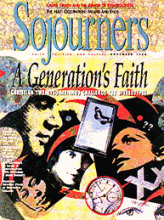Women of Appalachia are as diverse as the geography that defines them. They are rural and urban; African, European, and Native American; lesbian and straight; young and old; professional and unemployed. Their lives are marked by welfare checks and glass ceilings, isolation and overcrowding, immense pain and Christ-like joy.
The Appalachian Womens Alliance is a coalition of women leaders from communities in Virginia, Tennessee, Kentucky, West Virginia, North Carolina, Pennsylvania, Georgia, and Ohio who are organizing to improve the situation of women in the region. This past spring, the Appalachian Womens Alliance organized a caravan of women who traveled together for two weeks through Appalachia. In each location they connected with local women and networked with organizations that address violence against women and community development issues.
"We wanted to go to where women are," said Meredith Dean, the regional coordinator of the Appalachian Womens Alliance. "We could have organized a conference and probably have gotten maybe 200 women, but because we went out to meet women where they are, we reached more than 1,000. These women face so many barriersincluding geographical, racial, and classand the caravan was a visible, tangible symbol that we can cross those barriers.
"The vision going into the caravan was to address the broader issues around violence against women, encompassing economic, political, cultural, physical, environmental, psychological, and spiritual violence," Dean said. "We wanted to show how all of these are integrated in womens understanding of their lives. We found that physical violence is the starting place for discussion because that is where women are getting beaten and killed.
Read the Full Article
